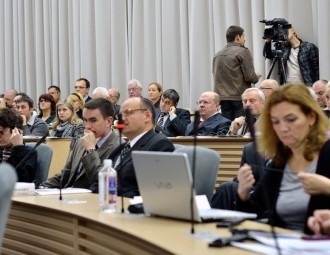Andrei Kazakevich: If we hold the Congress in Belarus, pressure will be exerted
 photo by Aliaksei Bratachkin
photo by Aliaksei Bratachkin
Why does the largest annual event for Belarusan researchers take place outside the country? And for what gold do the representatives of the academic community dig Kaunas every autumn?
Few days are left before the 4th International Congress of Belarusian Studies is to start: this year it will take place on 3-5 October 2014 in Kaunas (Lithuania).
On the threshold of the largest event organized for researchers a correspondent of “EuroBelarus” Information Service talked with one of the organizers of the Congress, Andrei Kazakevich, the director of the Institute for Policy Studies Palіtychnaya Sphera (Political Sphere).
- Please tell us what are the attractions of the Congress in Kaunas this year?
- This year, just as all the previous years, a wide range of disciplines, both social and political as well as humanitarian, are present at the Congress. However, international problems, and the influence that Ukrainian events exerted on Belarus, Lithuania, Poland, and other neighboring countries, will be prioritized. Cooperation of our region with the Far East will also get a lot of attention; we even plan to organize a special panel.
- More than 450 scientists from 20 countries will attend the Congress. Is it different from the previous year?
- Yes, this year we will have a little more participants than the previous. But quality is more important than quantity; and the level of this scientific event is getting significantly higher, which can be seen in the context of particular panels, discussions, and so on.
- In what sections and panels do you plan to participate?
- This is a good question, as being involved in all sorts of organizational questions, it is hard for me sometimes to take part in the academic part of the Congress. However, I’m planning to take part in the sections dedicated to political science.
- What political questions seem to be most important to discuss for you as a researcher in this sphere?
- It is basically the questions I mentioned at the beginning – Ukrainian crisis; and, secondly, relations between Belarus and the Far East, and, first of all, with China.
It seems to me that at present, with the power being divided at the regional level, it is very important to study different tendencies in the Belarusan politics. This level is often neglected, but it is undergoing considerable changes, which influence the way our country is developing.
Besides, there are a lot of issues to discuss, taking into account the events that have happened this year.
- Belarusan researchers refer to the Congress as to the largest event for the academic community of Belarus. Then why is it held at the territory of the neighboring country, not in the homeland of Belarusan science? What are the hindrances for that and how likely is that we overcome them?
- First of all, it is an International Congress, which provides for the participation of foreigners. And if we do it in Belarus, there’ll be certain problems with getting visas and logistics, such as expensive flights to Minsk.
Despite the necessity for the participants from Belarus to organize their travel to Kaunas on their own, the Congress comes to be less costly in Kaunas than in Minsk. Besides, Lithuania doesn’t have the problem with hotels we do, and their price is much cheaper.
It is this very important logistical and financial reason that prompts us to organize the Congress outside Belarus.
Second reason lies in the atmosphere reigning in the academic community in Belarus, where the authorities still control what topics are discussed and which people present them…
And, of course, it is high possibility that organized in Belarus, the Congress will feel certain pressure, even though we don’t cover actual political problems, and most of our participants aren’t related to the actual politics.
I don’t mean to say that we are facing some serious confrontation here, but, nevertheless, these are important factors that make us organize the Congress outside Belarus.
- What results do you expect from the Congress?
- First of all, we expect communication between the representatives of the Belarusan and foreign academic communities that are involved in Belarus’ studies; communication between different sections and different departments within separate sectors.
We demonstrate the practice of such regular scientific places; and that is why we look upon the Congress as upon an important place where it is possible to organize such communication.
Thus, new knowledge, new understanding of reality, and new projects of establishing contacts between the representatives of the Belarusan academic community with such of other countries are our expectations.
Second result is a deeper understanding of problems existing in the Belarusan society, Belarusan culture, and Belarusan politics through discussions within the frames of the Congress.
And we also expect the new understanding of certain problems to be beneficial for the modern Belarusan society and Belarusan academic sphere and knowledge to be translated through mass media, experts, and scientists to the broader public.
-
03.01
-
07.10
-
22.09
-
17.08
-
12.08
-
30.09



























